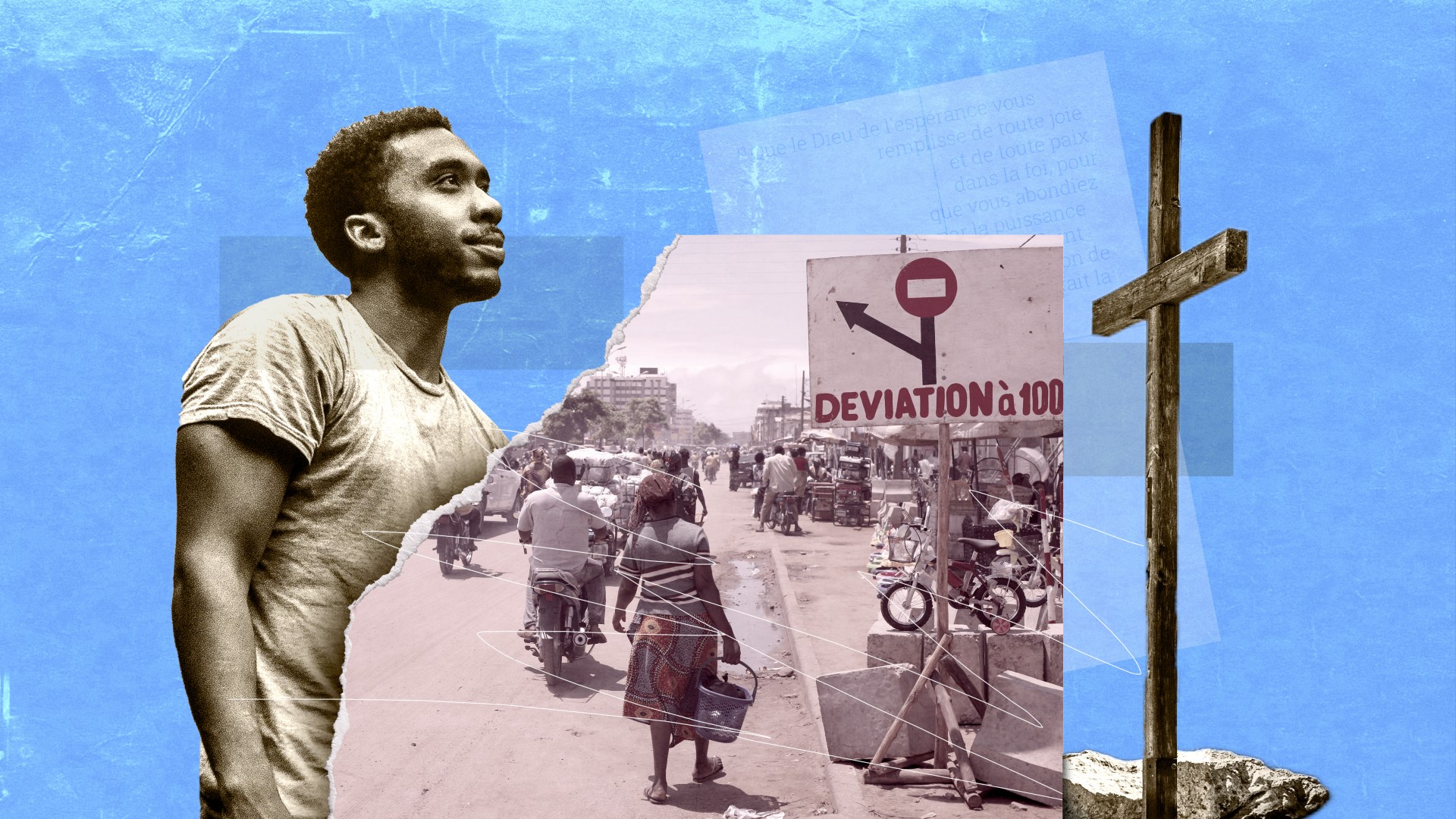During a recent exchange with a colleague I knew to be quite ambitious, a few of his words stuck with me: “I would rather live a difficult present with my resources than continue to save resources for an uncertain future. Who knows? The way things are going, the world may end tomorrow.”
The COVID-19 pandemic has led many to think that it is difficult or even impossible to continue to dream and believe in a better future.
Like my colleague, many around us have abandoned projects and are touched by various levels of depression that keep them from looking toward the future. Some have succumbed to suicide when they saw no other way or because they could not imagine living without their close family members who were tragically taken away by the virus. Many hopes have been dashed.
In my country of Benin, many businesses have been forced to cut back on work hours, which has resulted in staff layoffs. Some families have struggled to provide for their basic needs. Certain products that are now difficult to obtain.
And that is not all. The International Labor Organization announced last year that “global unemployment will reach 205 million people by 2022.” How can we not lose hope when faced with these challenges?
Two kinds of hope
Unlike English, which uses the word hope broadly, the French language uses two words that derive from the word espérer (to hope): espoir and espérance. Both can first refer to something hoped for. In this sense, the word espoir usually refers to an uncertain object; that is, someone who hopes for something in this way does not have the certainty that it will happen (“I hope the weather will be nice tomorrow”). On the other hand, espérance describes what, rightly or wrongly, is hoped for or expected with certainty. It often refers to a philosophical or eschatological object (“I hope in the goodness of human beings”; “I hope for the return of Jesus Christ”).
When we speak of espoir or espérance, we then have in mind different types of objects hoped for. This difference matters, because both terms also commonly refer to the state of mind that characterizes the hopeful. And this state of mind will be different precisely according to the object hoped for.
Having espoir for an uncertain yet better future in these difficult times may be a good thing, but it is not enough. Such hope can be disappointed and easily fade away when our wishes and expectations (our hopes) do not materialize.
The opposite is true with espérance, which is deeper than our desire and wish for an end to a crisis or a future without pain and suffering. To face the trials of life, we need peace and joy in our hearts that come from expecting certain happiness. This is what espérance is: a profound and stable disposition resulting from faith in the coming of what we expect. In this sense, it is similar in meaning to the English word hopefulness.
If we have believed in the Son of the living God, we have such a hope. It rests on the infallible promises of our God, who knows the plans he has for us, his children—plans of peace and not misfortune, to give us a hope and a future (Jer. 29:11). By using the two meanings of the word, we can say that the espérance that the fulfillment of his promises represents (the object hoped for) fills us with espérance (the state of mind).
God is for us the source of an unfailing hope. That’s reassuring! So how do we live out that hope in the midst of trials?
A way of life
Several months ago, my sister participated in a training program in a country where the number of pandemic victims was constantly increasing. She was about to return home when many governments decided to close their airports. Exiled in a foreign land, in a country under the pressures of a pandemic, in the midst of her fears, she decided to trust in God.
“A stranger helped me reach out to the organizers of the training I had attended. He put me in touch with a man of God who then provided me shelter. The times of meditation, prayer, and sharing, with my sister from a distance and with my host family, were a real support to me during the moments of general panic,” she said after she returned home.
I have lived with my sister for almost six years. We have faced many situations together. The worries of one immediately become subjects of prayer for the other. She was finally able to return and resume her job, but the five months of her absence for the training and confinement, with all the uncertainties of these times, were a real test of my faith also. Yet with our hope in the Lord, I was able to overcome the loneliness, and we stood firm despite very real financial and professional challenges.
By paying attention to God’s faithfulness in times of joy or difficulty, we learn to make hope our way of life. And this prepares us.
We each have our trials of varying intensity. There are many who have been tested much more heavily than we have during this crisis, who have seen their expectations crumble. But what we have experienced on our own scale has drawn my attention to the crucial importance of an espérance-like hope.
In a CT article titled “Our Nostalgia Is Spiritually Dangerous,” Jeremy Sabella points out, “Hope, in its full biblical sense, arises out of hardship: ‘suffering produces perseverance; perseverance produces character; character produces hope.’ This hope endures precisely because it is the work of the Spirit: ‘hope does not put us to shame, because God's love has been poured out into our hearts through the Holy Spirit, who has been given to us’ (Rom. 5:3–5). Hope takes root when the people of God follow the Spirit’s prompting to face the present trial.”
Hope manifests its depth when it remains active in the midst of trials. The hope of which the Bible speaks, that which Christ has placed in our hearts through the Holy Spirit, is a constant support that will never fail.
Testimonies of hope in trials
Hope does not shelter us from the trials and difficulties of life, but it helps us overcome them with serenity and joy. Scripture reminds us of this.
“Against all hope, Abraham in hope believed and so became the father of many nations” (Rom. 4:18). Who could still hope to conceive a child at the age of 100 with a 90-year-old wife? Abraham did it! Who can still hope for a future without pain and suffering? We can! For a Christian to hope in times of difficulty shows full trust in the One who promised to make all things new: God.
Job, having lost everything and living in an almost indescribable situation, expressed confidently and persistently his true hope when he said, “I know that my redeemer lives, and that in the end he will stand on the earth” (Job 19:25). The continuation of Job’s story shows how his hope was rewarded (42:10).
Amid the fiercest storms we can imagine (rejection, persecution, etc.), the apostle Paul did not lose his hope either. Whether the situation was favorable or not, he believed and waited with patience and joy for the glorious future reserved for him. It was in the middle of these sufferings that he wrote several letters to Christians in different cities to encourage them to develop and keep their hope in the Lord. Note this excerpt addressed to the Christians of Rome who were also going through difficult times: “May the God of hope fill you with all joy and peace as you trust in him, so that you may overflow with hope by the power of the Holy Spirit” (Rom. 15:13).
Hoping together
In our country, like in many others, the moments of quarantine have resulted in more online Christian meetings for prayers and encouragement. When asked what a Christian community that collectively hopes looks like, a sister in Christ told me, “It looks like a strong tower, like an unshakable army!”
Yes, a community filled with hope is a real support for the world in the face of trials and difficulties. It offers resistance in the face of despair and discouragement. It is a light that shines in the darkness.
I rejoice to see, like the apostle Paul, many Christian communities continuing to share the comforting message of hope, despite their various struggles. Throughout this crisis, I am grateful to have read articles from Christians like Jay Y. Kim, Anne Lécu, Kelly B. Trujillo, and many others who have taken up the pen to send their message of hope to the world. The line of witnesses of hope is not extinguished.
We are all facing this global crisis, as well as our personal problems and daily difficulties. We are all affected in one way or another, and some in terribly tragic ways. But our attitude toward it all is decisive.
My prayer is that, whatever darkness we go through, our hope in the Lord Jesus Christ will always remain alive, active, and practical. It may not be easy, but together, “let us hold unswervingly to the hope we profess, for he who promised is faithful” (Heb. 10:23).
Syntyche D. Dahou is an administrative assistant. She is involved in the Groupe Biblique des Élèves et Etudiants du Bénin (GBEEB), a member movement of IFES (International Fellowship of Evangelical Students). She is passionate about Christian literature and is interested in ministry through Christian publications.
Translation completed by Sarah Buki









